New Jersey Last Will and Testament Form
A New Jersey last will and testament is an essential estate planning document that represents the final wishes of a testator with regard to their private property and in what way they would want it to get distributed among their chosen heirs. To be valid a will in this state must be attested and signed by two competent witnesses disinterested in the testator’s estate.
Download and use our NJ will template provided in PDF and Word formats that you can fill out yourself. We also offer essential guidelines for writing a last will and answer common questions related to this document.
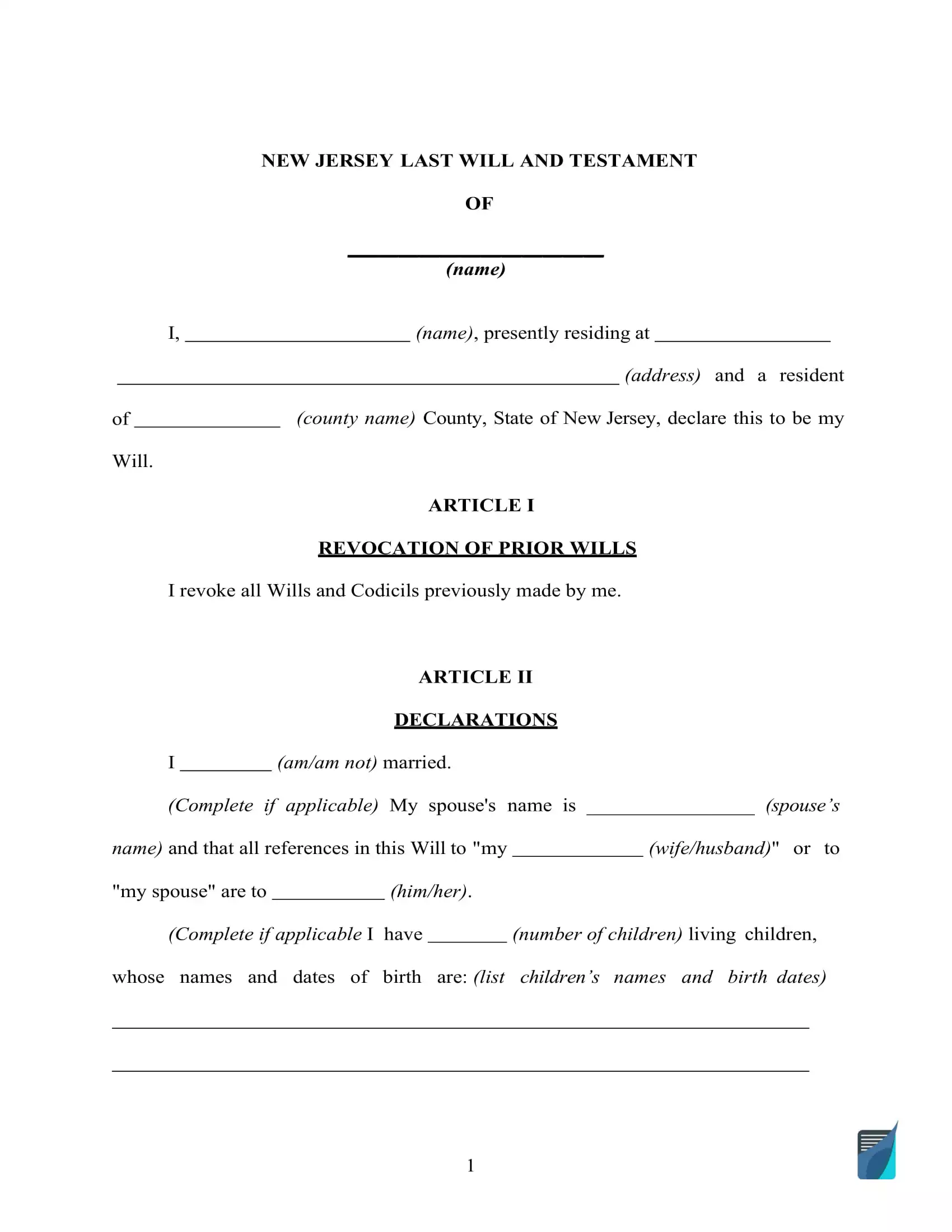
Build Your Document
Answer a few simple questions to make your document in minutes
Save and Print
Save progress and finish on any device, download and print anytime
Sign and Use
Your valid, lawyer-approved document is ready
New Jersey Will Requirements and Laws
| Requirements | State laws | |
| Statutes | Title 3B – Administration of Estates – Decedents and Others | |
| Definitions | 3B:1-1 Definitions A to H | 3B:1-2 Definitions I to Z | |
| Signing requirement | Two witnesses | 3B:3-2. Execution; witnessed wills; writings intended as wills |
| Age of testator | 18 or older or married minor | 3B:3-1. Individuals competent to make a will and appoint a testamentary guardian |
| Age of witnesses | 18 or older | 3B:3-7. Who may witness a will |
| Self-proving wills | Allowed | 3B:3-4. Making will self-proved at time of execution |
| Handwritten wills | Recognized if meeting certain conditions | 3B:3-2. Execution; witnessed wills; writings intended as wills |
| Oral wills | Not recognized | |
| Holographic wills | Recognized if meeting certain conditions | |
| Registering a will | Possible with the New Jersey Secretary of State’s Office A fee is $10 | 3B:3-2.1. Creation, maintenance of will registry; fees |
How to Write a Will in New Jersey
Step 1. Consider your options first. Determine whether you would like to create your will by handwriting it all, filling out a last will and testament form, or using a step-by-step document creator we provide. It might also make sense to consult an attorney if you have a lot of assets.
Please, familiarize yourself with all will requirements and laws related to will-making in the State of New Jersey before getting started.
Step 2. Specify your information (as the testator). The first step is establishing the testator by writing their full legal name at the very top, as well as their residential information (street, city, county, and state). After that, make sure it’s all correct by going over the information you’ve just entered and the remainder of the section.
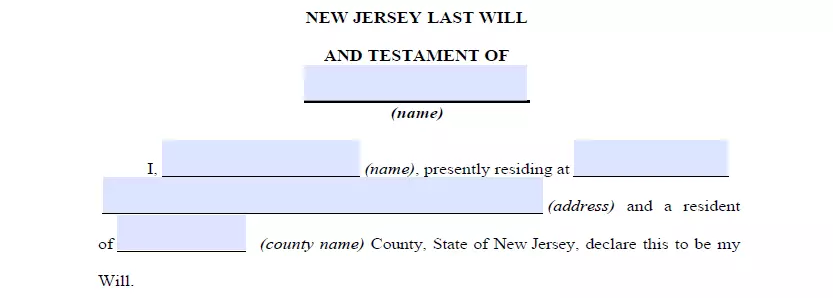
Step 3. Choose the executor (personal representative). In this passage, you choose who’s going to carry out your last will and testament by filling in their full name, together with their street address, city, county, and state of residence.
Almost all states have special policies concerning out-of-state representatives and executors, which often means additional hassle and red tape. For example, In New Hampshire, a nonresident executor must post bond if your will doesn’t say that they don’t have to. (See 3B:15-1 Bonds of fiduciaries; exceptions.) Thus, it is recommended to appoint a person who lives in the same state as you.
As a precaution, you may choose an alternative executor of your last will and testament. That way, you’ll be able to make sure that, even if the initially chosen executor is unable to carry out their obligations, there’s another trustworthy person you can rely on.
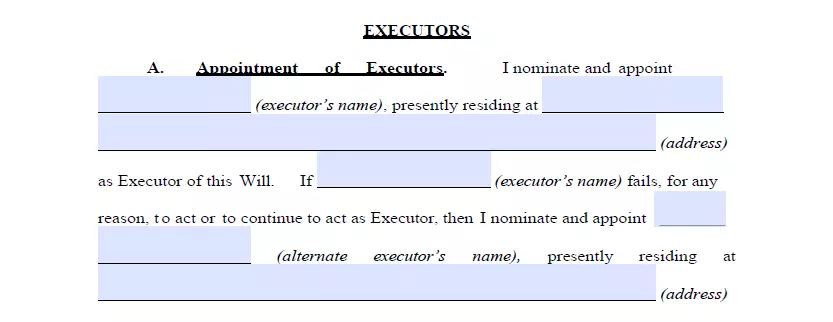
Step 4. Indicate the guardian for minors (optional). In case you have underage or dependent children and don’t wish the court to pick a guardian for them when you are no longer here, you can appoint a friend or a relative as a legal guardian for your children.
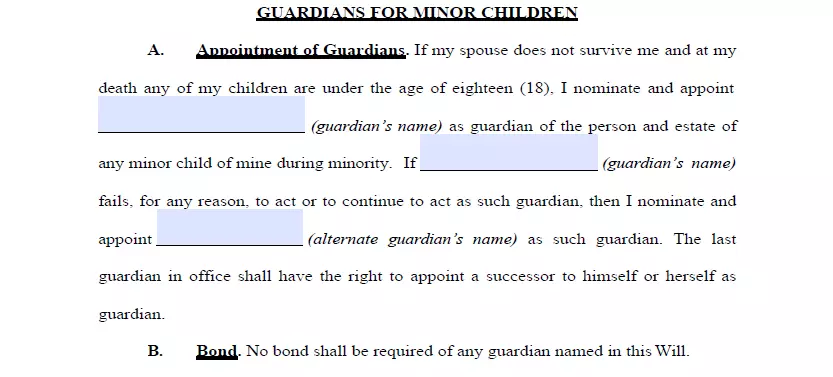
Step 5. Establish your beneficiaries. Now, indicate people to whom you want to pass down your assets, that is, your beneficiaries. Fill in their full names, places of residence, and your relationship to them (e.g., spouse, child, friend).
Step 6. Outline property distribution. List your property and explain the way you want to distribute it to your beneficiaries if it’s not dividing the property commensurately. You can include money for arrearage, realty, stocks, business ownership, cash, as well as any physical items of monetary worth that count among your possessions. However, shared and living trust property and assets, along with your life insurance, can’t be put into your will.
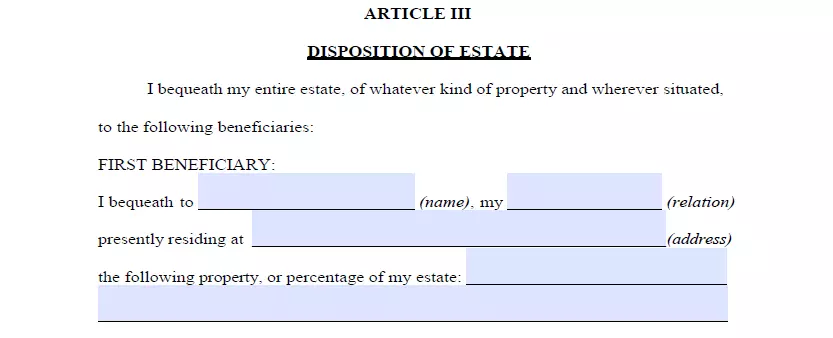
Step 7. Proceed with the witnesses putting the signatures at the end of the document. According to the New Jersey law (3B:3-2), for any will to be considered legally correct, it has to be signed by two witnesses. They have to be over 18 years of age and have absolutely no interest in your testament, which means they can’t be your beneficiaries. Now, you (as well as your two witnesses) have to sign the will after filling in your full legal addresses and names. Do not forget to check every paragraph thoroughly prior to finalizing the will.
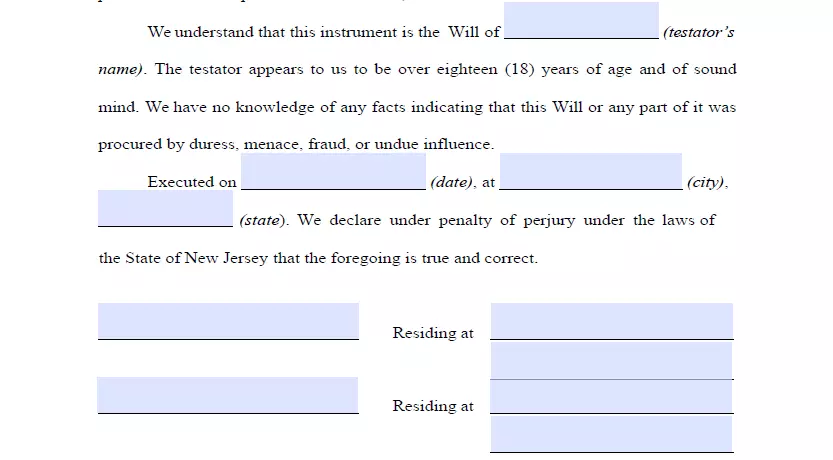
Make a Last Will and Testament Valid in New Jersey
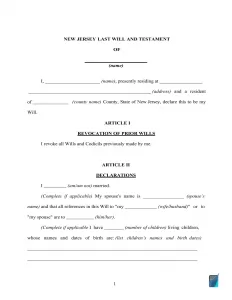

Frequently Asked Questions
Is a New Jersey will effective without a notary certification?
Yes, New Jersey law affirms that a will is valid without having a notary public authorize it.
Exactly what does it mean to be testamentary capable?
To be able to make your will in NJ and change it (to be testamentary capable), you must be of sound mind and at least 18 years of age. Being of sound mind means that you don’t have any kind of mental illnesses (dementia, senility, insanity, Alzheimer’s, etc.) that don’t allow you to have an understanding of what your property is, who’s going to get it, what a will does, and how it all is connected.
Can you leave out your spouse from a last will?
You can, but it will not bar them from getting some part (about one-third) of your property through the elective share right regardless of what’s in your will unless they agree to waive this right themselves.
Am I allowed to change a typewritten last will after signing it (in NJ)?
Yes, you’re allowed to adjust it. In New Jersey, in case you haven’t entered into a contract that mentions the opposite, you can revoke or modify your will whenever you want.
It will be a wise decision to amend your last will when a major event comes about in your life. These include but aren’t limited to:
- Child birth or adoption
- Divorce or marriage
- Selling or buying real estate
- Winning a lottery
- Inheriting someone’s estate, etc.
Use a codicil to will for minor changes and create a new will for major ones.
How should I act in case my will has been lost?
In New Jersey, you can probate a misplaced will, but it’s not as simple as probating the original because you have to prove that it was lost after the testator’s death and that the testator didn’t intend to revoke it. Yet, it is possible, and here’s an example of such a case – In the Matter of the Estate of Harold Becker.
If I am physically unable to sign my last will, what do I have to do?
As indicated by the New Jersey Notary Public Manual (under Requirement for Individuals Unable to Sign), it’ll be possible for another person to sign the testator’s last will, considering that it is your (as a testator) directive and in your presence, followed by notarization with specific wording.
| Related documents | Times when you might want to create one |
| Codicil | Your last will needs one or several minor changes. |
| Self-proving affidavit | You would like to expedite the probate in the future. |
| Living will | You want to declare your wishes regarding the end-of-life treatment and life-prolonging procedures. |
| Living trust | You would like to consider an alternative to a last will. |
